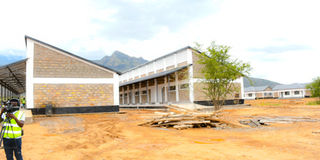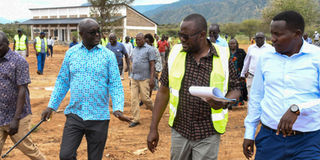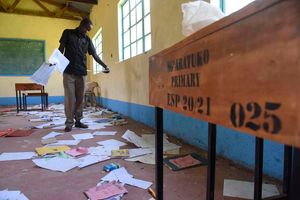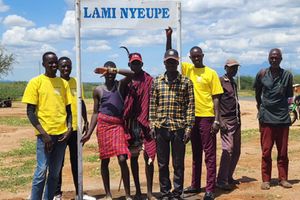
Sangak primary school at Lami Nyeusi in West Pokot County on November 11, 2024.
Straddling the border of Turkana and West Pokot counties, Sangak Primary School stands as a symbol of peace, unity, and hope, reshaping the image of a former bandit zone.
In the two months that it has been operational, the school opened in May has managed to bring together children from historically rival communities, and is promising to rewrite the story of Lami Nyeusi, once a notorious battleground for bandits and highway robbers in the region.
The school, which was constructed by the Kenya National Highways Authority (KeNHA), with funding support from the World Bank’s International Development Association, sits on a 60-acre land, and can host at least 800 learners from the Early Childhood Development Education (ECDE) to upper primary levels.
It was built as part of a government initiative to address border conflicts and related challenges that have limited access to quality education along the border of Turkana and West Pokot counties.

West Pokot Governor Simon Kachapin with other officers at Sangak primary school at Lami Nyeusi in West Pokot County on November 11, 2024.
As of Monday, the school had enrolled 382 learners, with five Teachers Service Commission (TSC) teachers, five employed by the Parents Teachers Association, and one volunteer, according to head teacher Mr Romanos Lochale. Eight of the learners are from the Turkana community.
“The school is significantly picking. We have learners from Lamu Nyeusi, Orwa, and Kambi Karaya,” Mr Lochale said.
180 of the learners are boarders being supported by their parents because the school has yet to receive capitation from the government, and the rest are day scholars, most of them in ECDE, the headteacher said.
He said learners are protected around the clock as two National Police Reservists (NPRs) guard it on a day and night rotational basis.
According to West Pokot Sub County Deputy County Commissioner (DCC) Mr Wycliffe Munanda, the establishment of the school was a key step towards addressing the challenge of school dropout attributed to insecurity in the region.
"The region has high school dropouts due to insecurity cases, poverty, and the long distances children travel to school,” he said.
West Pokot County Director of Education, Mr Simon Wamae, said the school is part of a broader effort to enhance education opportunities in areas affected by insecurity and was optimistic that it will help address educational disparities in the region and positively impact the local communities.
He termed it a safe learning environment for learners who previously could not attend school because of safety concerns.
“When our children grow up, they will appreciate the importance of living together in peace and unity. It will shape their minds to understand that they need each other and that for development to happen, there must be peace,” he said.
West Pokot Governor Simon Kachapin hopes the school will help curb inter-ethnic hostilities that have been experienced in the region and support community development.
“This project is not just about classrooms and buildings. It is about giving our children hope, reducing inter-community conflict, and building a united future for Pokot and Turkana families. We are seeing the importance of the school since communities have already begun to integrate,” the Governor said.
A parent, Mr David Domungura, said the region is now experiencing a new wave of peaceful interaction among residents who have since stopped cattle rustling and banditry activities.
“This is a new dawn for our children. We now live in relative peace,” he said.
Before he was appointed the Deputy President, Prof Kithure Kindiki, as Interior Cabinet Secretary, said the government would construct five cross-community schools in the education for peace initiative in the volatile North Rift region. He cited five schools, namely Dira, Todo, Tuwit, Lomuke, and Chepchoren, which would offer compulsory education to pupils from Elgeyo Marakwet, Baringo, and West Pokot counties.
Prof Kindiki said that by studying together, children from different communities would grow into a new generation that will foster long-lasting, peaceful, and harmonious coexistence and end years of cross-border hostilities that fuel insecurity.
“All pupils must go back to school, and the government will make sure they are secure to facilitate uninterrupted learning,” he said, noting the government’s commitment to protect all learning institutions in bandit-prone areas to facilitate access to education.






